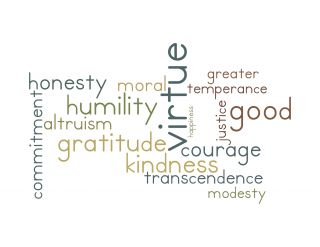Narcissism
How the Things You Say Pave the Road to Character
Why David Brooks should start a cult.
Posted July 6, 2015
“Having changed ourselves, we no longer perceive our transformation.”
Roger Kimball, The New Criterion
If you’ve ever met someone who belongs to a cult-like group, the first thing you notice is they talk funny. You recognize all the words, but the way they use those words is nonstandard—just a little different, a little strange.
How we use words is a powerful force in creating our reality. Research indicates that how we use words may even structure aspects of cognition. According to cognitive scientist, Lera Boroditsky, such things as time, color, number, musical pitch, kinship relations, memory, emotion, and even morality may be dependent upon how we speak. The way we use words may actually alter the way we perceive the world and engage with it.1

So, I was thinking... what if David Brooks started a cult? At the 2015 Aspen Ideas Festival, Katie Couric interviewed the New York Times op-ed columnist and author about his latest book, The Road to Character. Brooks told moving stories about historical figures overcoming suffering, developing self-awareness, confronting their sins, and giving and receiving deep, abiding, and humbling love. But what was perhaps most poignant was the authenticity with which he spoke about his own character. “I’m paid to be a narcissistic blowhard,” he read from his book, “I have lived a life of vague moral aspiration—vaguely wanting to be good, vaguely wanting to serve some larger purpose, while lacking a concrete moral vocabulary, a clear understanding of how to live a rich inner life, or even a clear knowledge of how character is developed and depth is achieved.”
Brooks used words like gratitude, bravery, humility, and kindness. We all know these words, but apparently we don’t use them much. According to Brooks, our use of these words has significantly declined over the past 40 years—by some estimates between 49% and 66%. As our use of these words has diminished, our culture has become more self-promotional and self-aggrandizing, and without noticing, we ourselves have become more narcissistic. In a 1950's survey Brooks cites, reported in Jean Twenge's book, Generation Me, 12% of high school students surveyed said they thought they were a “very important person.” Within 40 years the proportion ranged from 77% to 80%. Twenge and her coauthors in a 2009 article in the journal, Clinical Psychology Review, discuss the trend toward narcissism, citing cultural shifts toward materialism and status and away from community, meaning in life, and affiliation.
In 2011, Psychologist Nathan DeWall, discovered that over the past 3 decades, the use of the words “I” and “me” in music lyrics had increased, while the use of “we” and “us” had declined. According to psychologist Keith Campbell, a nationally recognized expert on narcissism, by the 2000s there had been a 30% increase in narcissism among college students in only 2 decades, and by 2006, 1 in 4 college students agreed with the majority of the items on a measure of narcissistic traits. “The narcissism epidemic is just as widespread as the obesity epidemic,” warns Campbell and co-author, Jean Twenge in their book, The Narcissism Epidemic.
Even if we don’t meet the criteria for narcissism ourselves, Brooks cautions, unwittingly we have been grading ourselves on a forgiving curve. “You figure that if the people around you seem to like you, you must be good enough. In the process you end up slowly turning yourself into something a little less impressive than you had originally hoped.” What Brooks calls the “noise of the fast and shallow communication” makes it hard to hear the “soft, still, quiet voice of the depth.”

Well that’s where the David Brooks cult comes in. Given his own humility, we would not be able to call it the “David Brooks Cult,” so let’s call it the “Cult of Character.” In the Cult of Character, moral goods would be a primary subject of public discourse. We would be irksome to our non-cult-member friends by incessantly talking about virtues like wisdom, kindness, justice, courage, temperance, and transcendence. Our conversations would be filled with ways to discover our “fake life of moral aspiration,” and we would notice when we “slip into a self-satisfied moral mediocrity.”
We would be immersed in a moral ecology of the “crooked timber” rather than that of the “golden figure of goodness.” Instead of affirming that we are special, and reifying our sense of the “big me,” we would learn the words and expressions designed to have us delve deeply into the ways in which we are flawed, the demons we need to conquer, and the inauthentic selves we commit to master. Our lexicon would support us in engaging in a struggle to balance our selfish motivations with our selfless ones. We would strive toward both doing good and being good. We would become instruments of service while engaging in what Brooks describes as “radical self-awareness from a distance.”

We would be forthright in our attempts to reconcile within us what Brooks calls “Adam I and Adam II” (borrowing from Rabbi Joseph Soloveitchik’s Lonely Man of Faith). Adam I is the external-oriented self that strives to conquer the world; the career-oriented, ambitious builder who looks to create, produce, and discover things, to venture forth and explore, and who asks how things work; who uses straightforward economic logic that says input leads to output, practice makes perfect, effort leads to reward. Adam II is the internal self that strives to serve the world; the humble, moral giver who has inner character and a solid sense of right and wrong, is anchored, and who asks why things exist; who uses inverse moral logic that says, give to receive, surrender to something outside yourself to gain strength within yourself, conquer your desires to get what you crave, success can lead to the greatest failure which is pride, failure can lead to the greatest success which is humility and learning, in order to fulfill yourself you have to forget yourself, in order to find yourself, you have to lose yourself.
While we live in a culture that nurtures Adam I and neglects Adam II, in our cult we would support Adam I while nurturing Adam II by using words like “humility,” “modesty,” "courage," “kindness,” and “gratitude,” and by striving to be deserving. In our cult we would travel the road to character together, each of us creating with words and deeds a self worthy of the life we are given.
I hope David Brooks starts a cult. I would be his first member if I could find my way to the front of the line.
Or maybe I could find my way to the back of the line instead. ♦





